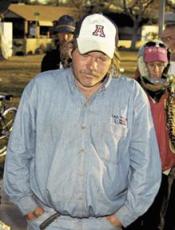Increasingly Vicious Laws Push Out Homeless
The NewStandardby Catherine Komp
Communities nationwide appear intent on testing the lengths they can go to suppress or expel their homeless populations -- anything to avoid having to see, let alone help, the least fortunate.
Richmond, Va.; Apr. 5 – In the face of rising homelessness, cities across the country are increasingly trying to push desperate people out of sight and out of mind. In addition to anti-panhandling, anti-camping and anti-loitering ordinances, some are targeting the few remaining public spaces where homeless people can go during the day – including parks and libraries.
On a recent sunny Sunday afternoon in Richmond’s Monroe Park, about 50 people gathered with plates of seasoned tofu and zucchini, squash and potatoes, fruit salad, sweets and coffee. The meal was organized by the local chapter of Food Not Bombs, a global network of anti-war, anti-poverty volunteers that provide free, vegetarian meals in hundreds of city parks.
"We like the park because it’s a public space, it’s a place where everybody can come," said volunteer Maria Medas.
But volunteers say the group’s weekly food distribution efforts and similar programs face a looming threat of being pushed out of the park, long an anchor of nourishment and community for the city’s homeless.
Next to the Food Not Bombs tables, several homeless people help Sam Bowser distribute the Sunday meal provided by the local chapter of HOPE Ministries Worldwide. "I’ve been serving homeless people for 20 years," Bowser said, "and the questions always asked is, ‘Do the people need it?’ Yes they do. I find the people depend on me to be here and anyone else who comes out here to feed the homeless people."
Whether it’s public parks or private shelters, homeless people have fewer and fewer places to go.But compassionate work by the likes of Medas and Bowser has met resistance from a group of neighborhood residents who argue the park is "languishing under an identity crisis." Pressure has also come from nearby Virginia Commonwealth University, where officials have also used their clout to pressure the city to privatize the park. The University has developed its own strategic plan to "address [the] need for more green space" for its students.
Medas said there has been an increased police presence at Food Not Bombs meals, and the group recently received a parking ticket for unloading in a spot it has used for years without any problems.
Donna Mills, a homeless woman helping Bowser serve HOPE Ministries’ Sunday meal, sees the treatment of the community’s poor as part of a long history of economic injustice. "[They] always run folks off of everything they want; they’ve been doing that ever since the beginning of time," Mills told TNS. "There’s enough for everybody, but you just got one or two group of people [that] just want the whole dang gone thing – don’t want to share nothing; want to keep you down and keep their self up; keep their self separated."
Battle in Downtown AmericaWhether it’s public parks or private shelters, homeless people have fewer and fewer places to go. According to a survey of 24 cities by the US Conference of Mayors, requests for emergency shelter assistance in 2005 increased by 6 percent. The survey also found the number of homeless families seeking shelter increased by about 5 percent, with about one in three reporting unmet needs due to a lack of existing shelter resources.
Stoops believes the increase in the homeless population is feeding the rise in city ordinances and polices that target those populations.Without enough temporary shelter for the needy, homelessness becomes more visible, leading to what homeless-rights advocate Michael Stoops described to The NewStandard as "a big battle in downtown American between the interests of low-income people and the interests of the business community."
Richmond’s libraries have also become a front in that battle. In February, the city enacted new codes of conduct allowing library staff to banish people who bring in more than two book bags, bags over 18 inches in length, plastic bags, bed rolls or luggage. People whose "personal hygiene is offensive so as to constitute a nuisance to other persons" or who change their clothes in the bathroom can also be removed from the library. The revised codes further state that failure to comply with the library’s rules may result in arrest.
In explaining the city’s new policies at a recent press conference, Richmond Mayor Douglas L. Wilder said, "The purpose of the libraries is to satisfy the needs of society that wants to enrich its cultural involvement relative to reading, writing, to youngsters, for older [people], for anyone else that wants to come there to learn."
The National Coalition for the Homeless (NCH) has been tracking anti-homeless initiatives for more than a decade, and has published several comprehensive reports on criminalization of the homeless. Using information, surveys, and interviews from 224 cities, the 2005 report designates the top 20 "meanest" cities for the homeless.
Since the last survey in 2002, the NCH found a 12 percent increase in laws prohibiting begging; an 18 percent increase in aggressive panhandling laws; and a 14 percent increase in laws prohibiting sitting and lying in public places.
Stoops believes the increase in the homeless population is feeding the rise in city ordinances and polices that target those populations.
"I think some Americans are tired of the issue, and they simply want the homeless to go away," said Stoops, acting executive director of NCH. "Business people put pressure on the mayor and the police and that’s why we see sweeps and the passage and enforcement of what we call ‘anti-homeless’ laws."
A Punitive ResponseA number of cities, including Richmond, Houston and San Francisco have decided that the homeless use of libraries has become such a problem that it merits stronger regulations for behavior and enforcement.
Public library access has become such an issue that the American Library Association (ALA) has created a subcommittee on library services to poor and homeless people. ALA president Lesley Burger said that libraries, like any public institution, have certain rules for conduct, for example prohibiting food and beverages, cell phones and profane language.
But on the issue of targeting the homeless, Burger said, "I think we need to be very cautious about mass stereotypes or using stereotypes to paint a broad brush about a whole group of people who may be innocent." Moreover, she said, libraries can serve as a valuable source of information on jobs and social programs for people trying to get back on their feet.
Mayor Wilder has also suggested rerouting bus routes off of the main downtown thoroughfare that passes by an upscale hotel, the Library of Virginia, the new courthouse, and VCU’s medical school. "We can't have all those people lying around outside the Library of Virginia, that beautiful building that I insisted be on Broad Street when I was governor," Wilder told the
Richmond Times Dispatch.
Darrick, an artist and homeless Richmonder who preferred not to give his last name, said he experienced first-hand the city’s crackdown on homelessness when police hassled him for lying in the park and working on a drawing. The officer, he said, accused him of "camping out."
"He said, ‘You got that bag, doesn’t that have your clothes and stuff in it?’ I said, ‘No, it has my art supplies in it,’" Darrick told TNS. "They harass you."
Both Darrick and NCH President Stoops emphasize that one of the key problems for homeless people is that there is nowhere to go during the day. But instead of funding accessible "day centers" – facilities with indoor seating, showers, laundry, and referral services -- many places try to sweep the homeless to less visible areas. In Richmond, city officials are trying to move homeless services away from downtown to a blighted industrial area near the parole office and city jail.
In San Francisco, complaints about homeless people congregating in front of the library compelled the city to implement the "Homeward Bound" program, which has given nearly 1,000 homeless people one-way bus tickets out of town.
And in Atlanta – the fourth "meanest" city in the NCH’s study – local lawmakers banned panhandling in the downtown area and at bus stations, the airport and sports arenas. The ordinance also prohibits people from "requesting a donation of money" in business-district areas.
"It sounds like a Jim Crow law," said Stoops.
Anti-poverty and free-expression advocates raise constitutional concerns surrounding restrictions on begging and inhabiting public spaces. The NCH points out that courts have struck down laws that criminalize necessary activities for homeless people, like sleeping in public, citing the Eighth Amendment protection against cruel and unusual punishment.
Beyond laws and ordinances, some city governments and businesses have used physical barriers to restrict not just the homeless, but people in general from taking up public space. Physical implements like seat-less bus stops, metal spikes on ledges, and metal barriers over subway grates have all cropped up to make urban spaces less accommodating.

President Bush’s $2.77 trillion 2007 budget proposal includes numerous cuts to programs for poor and homeless populations, including the Community Development and Social Services Block Grant programs, which fund low-income housing, childcare and child-welfare programs.
While the NCH notes that the budget proposal does boost funding for Homeless Assistance Grants and Housing for People with AIDS, the organization says it does so at the expense of other housing initiatives that could prevent or alleviate homelessness. Congress could vote on budget resolutions this week, before the Easter recess.
For the programs and communities that do receive federal funding for homeless and poverty programs, the NCH advocates requiring cities to opt for more supportive initiatives over criminalization of the homeless. The group states that any federal funding for homelessness and poverty should be "conditioned on local government agreement not to punish homeless persons for conduct related to their status."
"I think the American people have grown accustomed to seeing people living on our city sidewalks and streets," said Stoops. "And that’s why we don’t give it a second thought or stop or even say ‘hello’ when we see people in the streets. We just walk on by."
© 2006 The NewStandard. All rights reserved. The NewStandard is a non-profit publisher that encourages noncommercial reproduction of its content. Reprints must prominently attribute the author and The NewStandard, hyperlink to
http://newstandardnews.net (online)
or display newstandardnews.net (print), and carry this notice. For more information or commercial reprint rights, please see the TNS reprint policy.



